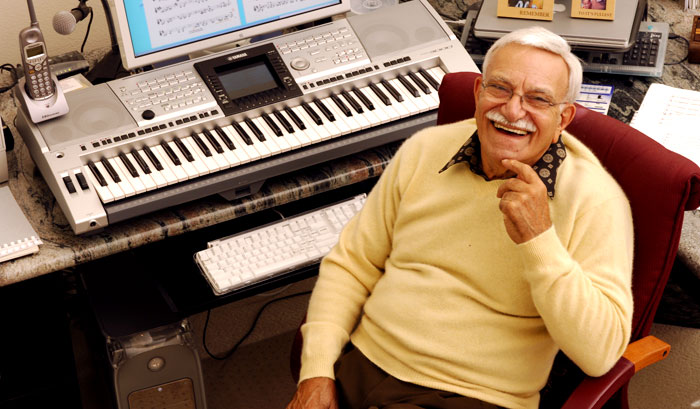


Not every musician can hope for a career as long and varied as that of renowned arranger/orchestrator Sammy Nestico.
Nestico started in the music business at age 17, in 1941, as staff arranger for a Pittsburgh, PA radio station WCAE. After serving in the military and graduating from Duquesne University in 1950, he became staff arranger for the US Air Force Band. In 1963, he transferred to the US Marine Band and directed the White House orchestra under Presidents Kennedy and Johnson. He was composer/arranger with the Count Basie Orchestra from 1970 to 1984 and worked extensively as an arranger/orchestrator for Capitol Records. He's written arrangements for Frank Sinatra, Sarah Vaughan, Barbra Streisand and Phil Collins, to name a few, and has created orchestrations for countless movies and television shows, from Mission Impossible to M*A*S*H. In addition to directing several high school and college music programs, he's published almost 600 arrangements for school bands and orchestras.
What inspired you to go into this field?
I didn't know I was going to be a musician. Like anybody else, I just loved music. When I was a teenager the swing era came in, and I took up the trombone. And within a year and a half, I knew what I wanted to be for the rest of my life. I practiced so hard--my mother used to coax me to go out and play, but I really wanted to be the best musician I could be. And at 17, I joined the ABC radio staff in Pittsburgh, PA. Now Pittsburgh at that time had five radio stations, and four of them had staff orchestras. There were jobs everywhere for musicians.
The PSR3000 is terrific. I can write for the whole symphony orchestra on this keyboard!
How has the typical working musician's job changed since then?
It's much harder now. I think young people today are light years ahead of where we were, musically. They're great! But the opportunities are not nearly as good. When I was young, there were dance halls with live bands. Amusement parks had bands. Radio stations had bands. Theaters had bands. Since then, the whole music field has changed--those jobs just aren't there. But there's always room for good musicians, even if there aren't as many opportunities today.
What's the most important aspect of arranging a song?
The whole point of arranging is getting across the concept of a song. What are we going to say about this tune? Is it sad? Is it happy? Does it swing? Is it pretty? Is it rain, or is it sunshine? As an arranger, you study the tune, talk it over with the vocalist, if there is one, and figure out which instruments you're going to use. Writing the actual arrangement is nuts and bolts--it's the concept that paints the picture.

What was it like working with the Count Basie Orchestra?
It was absolute, pure joy. Count Basie himself was the most wonderful person--he was a father figure for people like Quincy Jones, Johnny Mandel and myself. It was loose--he gave you lots of freedom and didn't impose any conditions on your music. Of all the people I've worked with, Count Basie was my favorite.
How did you become Chief Arranger and Director for the White House orchestra?
As the Marine Band Arranger, I was also the Director of the little orchestra that played for all the White House functions under President Kennedy, and then President Johnson. I remember President Kennedy had gone to Europe on a goodwill tour, and he went back to his ancestors' home in Ireland. When he came back, he wanted these Irish tunes. So I got a little booklet of Irish folk songs and wrote arrangements of them. We put them on a cassette, and he played it on Air Force One. He also had a march that he wanted, an Irish march I'd written for him. It was very pleasant working with the people at the White House.
You have a Yamaha PSR3000 keyboard. How do you use it?
I use it all the time as a writing tool, like a notepad. It's terrific. I use it for my Boston Pops arrangements--I can write for the whole symphony orchestra on this keyboard! It plays back all my music for me, and it has so many beautiful sounds, especially the string sounds. And it can handle a lot of voices at once without breaking up. It's a great tool--and reasonably priced! I'm really enamored with it.
What advice would you give someone who wants to become an arranger?
An arranger should wear a lot of hats. Don't confine yourself just to one style. The more hats you wear, the more work you'll get. And personality counts! There are some extremely talented people who don't work as muchbecause they're not as pleasant, or they complain a lot. A good attitude helps--if something isn't just right, you make it right. And know your craft. Constantly learn more about your field. Breaks do come--and when they do, you'll be ahead of the game.
























